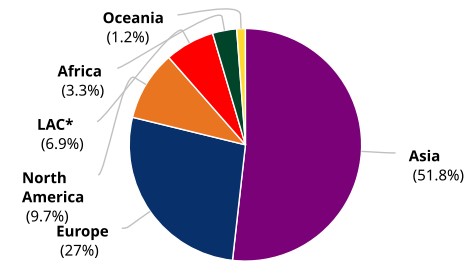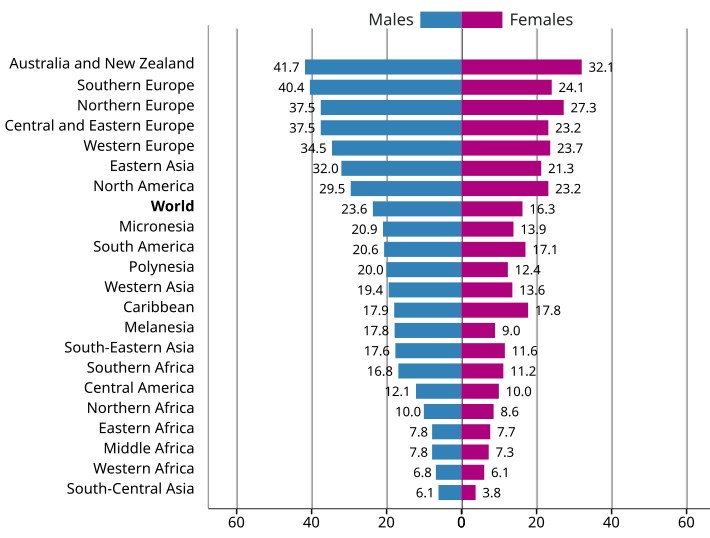The facts
„Colorectal carcinoma“ means several malignant tumor types in the colon or rectum. Malignant tumors rarely occur in other intestinal areas like small intestine or caecum. [1]
Colorectal cancer (CRC) had a low incidence rate in 1950. However, it became a predominant cancer type and now accounts for about 10% of cancer-related mortality in western countries.[1,2] CRC is the second most common cancer type in men and women in Germany. It ranks third behind lung and breast cancer worldwide. In Germany, about 26.000 women and 32.300 men developed CRC in 2016, while 11.400 women and 13.400 men died from it. More than half of the patients developing CRC had an age of 70 years and above. Only 10 % of the new cases occur before the age of 55. [2] The lifetime risk of developing CRC is about 6 %, with chronic inflammatory bowel diseases and other important factors like unhealthy diet or lack of exercise raising the cancer risk. Inheritable genetic mutations cause 3-5 % of all CRC cases, especially colon cancer. Affected people have a very high risk of developing cancer in the early age of 20-40 years. [1]
In the year 2018, the World Health Organization counted about 1,8 Mio new CRC cases and 880.000 deaths. [3,4] More than 50 % of the new cases were registered in Asia (see Fig. 1). The global incidence rate is estimated to increase up to 3 Mio until 2040. [3]

As described above, men are stronger affected by CRCs than women. [2,3,6] Additionally, cancer cases strongly increased in the developed countries due to the ageing population in the recent years (see Fig. 2). [3]

Sex differences
Although women have a lower incidence of CRC than men, right-sided CRCs occur more frequently in women compared to men, whereas left-sided CRCs have an equal frequency between both sexes. Several evidences demonstrate that the rate of right-sided CRC cases is strikingly higher in women than in men (61.7% vs 38.3%), while only slightly more left-sided CRC cases are observed in women than men (52.1% vs 47.8%). The reason for this sex difference is still not proven and of concern for women, due to the association of right-sided CRCs with the poorest clinical outcomes among all CRC patients. [5]
Studies revealed that metabolite rates in the glycolysis pathway, pentose phosphate pathway, carnitine shuttle metabolism, asparagine synthesis, methionine metabolism and the polyamine synthesis pathway showed sex-related differences when measured in tumor samples compared to normal samples. Tumors from women and men also used different metabolic intermediates between the sexes for energy production to support cell growth. [5] Thus, modern CRC therapy approaches should ideally consider not only common molecular information, but also details of sex-specific mechanisms.
Further studies also indicate that the gut microbiota is partly correlated with the tumor development as well as emerging drug resistance. [4,6]
The upgrade of personalized colorectal cancer treatment
Personalizing cancer treatment is still challenging. No expert believes in finding a magic cure against CRC nowadays. However, therapeutic approaches based on patient’s genetic variations provide the most promising chances for patients. Numerous genetic mutations are already associated with risk of CRC. [7] But the manual search for gene variants and appropriate drugs in cancer therapy is very labour intensive and time consuming, while the number of new medical insights gained from scientific research continuously increases. Further, economic acting must be brought into accordance with patient welfare.
Therefore, BioVariance has now developed the web-based platform OncoVariant to identify the most suitable medication for patients suffering from colorectal, breast or prostate cancer. State-of-the-art automatization and parallelization techniques are combined for comparing patient’s gene variants with profound knowledge from worldwide databases regarding treatment options. The final report contains information about patient’s variants and appropriate clinical evidence as well as information on the proposed drugs and their interactions. The examination of numerous high-quality databases ensures the high value of the proposed therapy options. Thus, OncoVariant enables personalized cancer therapy while minimizing time and effort on behalf of attending physicians. [8] Finding the perfect treatment for each patient is now as easy as never before.
Here you can find more information about the web-based platform OncoVariant.
Contact Person:




